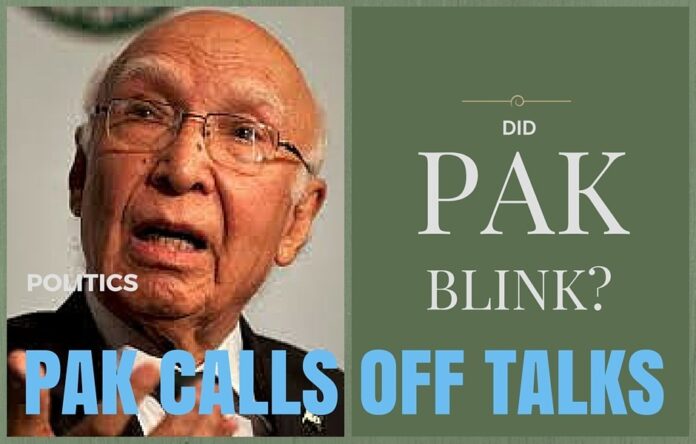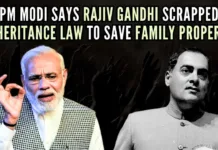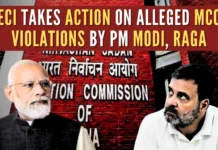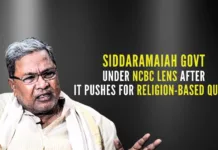
PerformanceGurus Staff
New Delhi
The Pakistan Army and its rogue Inter Intelligence Service (ISI) on Saturday succeeded in sabotaging the Indo-Pak talks, delivering a major setback to the process initiated by Prime minister Narendra Modi and his counterpart Nawaz Sharif to normalize relation between the two neighbors.
“Pakistan reiterates that the scheduled NSA-level talks cannot be held on the basis of the preconditions set by India,” a statement by the Pakistani Foreign Office said..
India said Pakistan’s decision to cancel the talks was “unfortunate” and it had not set any preconditions for holding the talks. “Pakistan’s decision is unfortunate. India did not set any preconditions. We only reiterated that Pakistan respect the spirit of the Shimla and Ufa Agreements to which it was already committed,” MEA spokesperson Vikas Swarup.
After a tension-packed day, during which the two nations traded blame and set up pre-conditions for talks, Pakistan formally called off the talks late at night. It is widely believed that the Pak Army and ISI forced Sharif to go back on the understanding arrived at between him and Prime Minister Narendra Modi at Ufa in Russia where the two leaders had agreed that their National Security Advisors will meet in Delhi to hold discussion on issues related to terror. It was also agreed that both the countries will try to resolve all their “outstanding’ issue through dialogue.
The talks collapsed on Pakistan’s insistence that Kashmir should also be part of negotiation and Pak NSA Sartaz Aziz should be allowed to meet with Kashmiri separatist leaders. India External Affairs minister Sushma Swaraj strongly rejected the two riders and said Pakistan must come to negotiation table in the spirit of the Ufa agreement and there was no place for a third party in the talk.
The fact that Sharif government had to bow down under pressure of the Army and the ISI exposed the fragile nature of democracy in Pakistan and helplessness of the civil authorities before the army and ISI.
In a press conference two hours after Aziz spoke to the Pak media and insisted that India must be ready to discuss the core issue of Kashmir, Swaraj made it clear that “There will be no talks, if Pakistan insisted on discussing Kashmir and allowing Hurrriyat leaders to hold parleys with Aziz.” She also set deadline of midnight for Pakistan to respond to her offer…
“There cannot be talk with terror, but there can be talk on terror, and it is a must. The understanding in Ufa clearly stated in writing that the agenda was decided.”
– Sushma Swaraj, External Affairs Minister, on Aziz’s demand that Kashmir should also be part of discussion
Reminding Pakistan that the recent agreement in Ufa where Prime Ministers Narendra Modi and Nawaz Sharif agreed that the NSAs of the two nations would meet only to discuss terror, Swaraj also tried to clarify that this should not be seen as a pre-condition for talks. On not allowing Hurriyat leaders to hold talks with Aziz, she said the Shimla agreement provided for bilaterally resolving all disputes between the two neighbors.
Firm on its resolve not to allow the Separatist leaders to meet with Aziz, the government detained two Hurriyat leaders— Shabir Shah and Bilal Lone — after they landed at the Delhi airport from Srinagar and put them under house arrest.
Stopping short of cancelling the talks, the External Affairs Minister said, “We are ready to welcome Sartaj Aziz if he doesn’t involve any third party and if talks remain confined to terror, as discussed in Ufa by the leaders of the two countries.”
Swaraj was responding to Aziz’s declaration that he was prepared to go to Delhi for talks without any pre-conditions, but also placed the rider that Kashmir should be part of the discussion.
Hinting that Pakistan’s army and Inter Service Intelligence (ISI) were behind the civil government’s flip-flop, Sushma accused Pakistan of trying to undermine the NSA talks under pressure from “known sources” which were opposed to dialogue with India.
On the “well-known forces” in Pakistan , Swaraj said while Indian political leadership can handle pressure, the Pakistani leadership cannot take it.
Earlier, in his press conference, Aziz tried to give the impression that Pakistan was ready for unconditional talks but also contended that modalities for future engagement on Kashmir must be taken forward during his engagement with Doval. During his Press conference which was broadcast live by most TV channels in India, Aziz spent most of the time harping that Kashmir remained the core issue between India and Pakistan and Islamabad will not put it on the backburner at any cost.
Aziz pointed out that the agreement reached between Nawaz Sharif and Narendra Modi stated that “India and Pakistan have a collective responsibility to ensure peace and promote development, and to do so, they are prepared to discuss all outstanding issues.” He sought to interpret that “all outstanding issues” include the core issue of Kashmir. However, the facts remained that the agreement clearly said that the NSA-level level talks will be to discuss “ all issues connected to terrorism.”
“We had agreed to discuss all outstanding issues and Kashmir is definitely part of it. India feels that terrorism is only Pakistan’s issue. Pakistan has already shared evidence of Indian involvement in terrorism with the United Nations,” he said.
Aziz said that Indian external affairs ministry’s statement that that Pakistan was trying to distort the agenda agreed at Ufa and imposing new conditions for the talks was “ far from truth.”
“The statement of Indian External ministry that Pakistan has imposed new conditions totally ignores the last sentence in the note handed over to the Indian High Commission that Pakistan is ready to hold NSA-level talks without any pre-conditions,” he said.
“In fact, it is India that has imposed new conditions that Pakistan cannot meet Hurriyat leaders, assuming the right to determine the guest list of for the High Commissioner’s reception,” he said.
Rejecting reports in the India media that Pakistan was apprehensive that if the talks were held Aziz will have to confront the dossiers prepared by the NSA Ajit Doval establishing the presence of Dawood Ibrahim in Pakistan and that nation’s involvement in abetting terror activities in India:
“ We also have three dossiers on India’s Research and Analysis Wing (RAW) involvement in terror activities. After handing over these dossiers to Mr.Doval, I can then also share them with the UN Secretary General.”
– Sartaj Aziz
He also displayed copies of the dossiers to media persons.
Aziz justified the invitation sent by the Pakistan High commissar to Kashmir separatist leaders saying it was going on for several decades and India had no right decide the guest list of Pakistan embassy.
Aziz said that he did not expect any breakthrough during the talks but he minimum agenda was to reduce tension and set a course for future talks.
Recalling that India had called off Foreign Secretary-level talks in Islamabad last year in August ,in protest against the Pakistan High Commissioner’s meeting with Hurriyat leaders in Delhi, Aziz said: “The reason for this regretful second cancellation if it is happening, would be the same. The invitation to three-four Kashmiri leaders to a reception organized in New Delhi on Sunday was to enable me to meet a cross section of Indian political and business leaders.”
The cancellation of the talks has come at time when Pakistan has stepped up infiltration from across the border and its troops were involved in repeated ceasefire violation on the Line of control in Jammu’s Poonch and Rajouri regions. The days ahead could the level of tension rising in the region.










